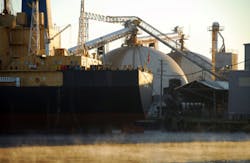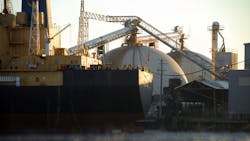Texas fertilizer plant blast may put projects worth $22 billion on hold
The blast at the Texas fertilizer production facility on April 17 may have far-reaching implications for the entire U.S. fertilizer industry. According to Bloomberg Businessweek, projects worth $22 billion may be delayed as a direct consequence of the explosion.
Currently, plans for at least a dozen new plants are underway, as part of a large-scale $100-billion investment scheme to boost North American manufacturing, covering areas ranging from plastics to steel. The construction of these fertilizer plants by the biggest U.S. producer of nitrogen fertilizer, CF Industries Holdings Inc., and by its competitors Agrium Inc., Koch Industries Inc. and Mosaic Co., may have to be put on hold. The plans would see investments worth $20 billion on new plants and nearly $2 billion on expansions in North America, including nine states and three Canadian provinces. The majority of those are planned to be built away from residential areas and those which are not could be relocated, explained Mark Gulley, a New York-based analyst at BGC Financial LP.
In an interview with Bloomberg Businessweek, Gulley said that a move against ammonium nitrate was likely to occur following the Texas incident. This form of nitrogen fertilizer is one of the possible reasons for the blast, preliminary evaluations suggest. Ammonium nitrate is highly explosive and is associated with several deadly terrorist attacks and industrial accidents.
While the industry is holding its breath to see how things will turn out, state and federal investigators continue to look into the causes of the Texas blast. According to state records, 270 tons of ammonium nitrate were stored at the facility at the end of 2012. Experts believe that the explosion may result in regulatory changes to implement more rigid regulation and control over ammonia production and storage safety procedures. Senator John Cornyn, a Texas Republican, has already confirmed that the explosion would lead to a federal review of chemical plant safety rules. However, analysts see delays in the development of fertilizer facilities as a plus, because time may give investors a fresh perspective and a way out of potential oversupply.
RELATED: Texas fertilizer plant failed to report ammonium nitrate amounts
Although the Texas blast may be seen by fertilizer plant opponents as a strong argument in their favor, the truth is that these plants are necessary for the economy of the areas where they are set to be built. Many of the places desperately need job opportunities and these plants can provide jobs and investment, claimed Mark Connelly, a New York-based analyst at Credit Agricole SA. Nevertheless, a focus on safety is a must. For decades, campaigners and employees have been putting pressure on regulators to review safety rules and to implement tighter control and oversight of chemical production and storage. The idea was picked up after September 11 but did not manage to get passed in Congress.
Nitrogen fertilizer is the most popular crop nutrient globally, with almost 107 million metric tons of it used by farmers worldwide last year, according to figures from Bloomberg Industries. Currently, about 50 percent of the needed fertilizer in the United States is imported but the new facilities would nearly eliminate the need for imports, Gulley added.

